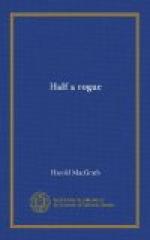“Is Richard in?” Bill asked. He had had only two drinks that evening.
“Mr. Warrington is in,” answered the valet, with chilling dignity. “What is your business?”
“Mine!” thundered Bill, who had a democratic contempt for a gentleman’s gentleman. “I have important business to transact with your master. Take this card in to him. He’ll see me.”
The valet looked at the greasy card. The name was written in ink; the card was of the kind one finds in hotels for the convenience of the guests.
“I will take the card to Mr. Warrington,” the valet promised reluctantly. There was, however, a barely perceptible grin struggling at the corners of his mouth. He was not wholly devoid of the sense of humor, as a gentleman’s gentleman should at all times be.
“William Osborne? What the deuce does he want here?” asked Warrington impatiently.
“He said his business was important, sir. If it is half as important as he acts—”
“No comments, please. Show Mr. Osborne in.”
Warrington turned all his mail face-downward. He knew Bill of aforetime, in the old newspaper days. Bill had marvelously keen eyes, for all that they were watery. The valet ushered him into the study. He wore his usual blase expression. He sat down and drew up his chair to the desk.
“Well, Mr. Osborne, what’s on your mind to-night?” Warrington leaned back.
“The truth is, Richard,” began William, “I found this letter on the pavement this afternoon. Guess you’d been down to the hotel this afternoon, and dropped it. I found it out in front. There was no envelope, so I couldn’t help reading it.”
Warrington seized the letter eagerly. It was the only letter of its kind in the world. It was enchanted.
“Mr. Osborne, you’ve done me a real service. I would not take a small fortune for this letter. I don’t recollect how I came to lose it. Must have taken it out and dropped it accidentally. Thanks.”
“Don’t mention it, my boy.” Very few called him Mr. Osborne.
“It is worth a good deal to me. Would you be offended if I gave you ten as a reward?”
“I’d feel hurt, Richard, but not offended,” a twinkle in the watery eyes.
Warrington laughed, drew out his wallet and handed William a crisp, crackly bank-note. It went, neatly creased, into William’s sagging vest-pocket.
“Have a cigarette?” asked Warrington.
“Richard, there’s one thing I never did, and that’s smoke one of those coffin-nails. Whisky and tobacco are all right, but I draw the line at cigarettes.”
Warrington passed him a cigar. William bit off the end and lighted it. He sniffed with evident relish.
“Seems impossible, Richard, that only a few years ago you were a reporter at the police station. But I always said that you’d get there some day. You saw the dramatic side of the simplest case. I knew your father. He was one of the best farmers in the county. But he didn’t know how to invest his savings. He ought to have left you rich.”




